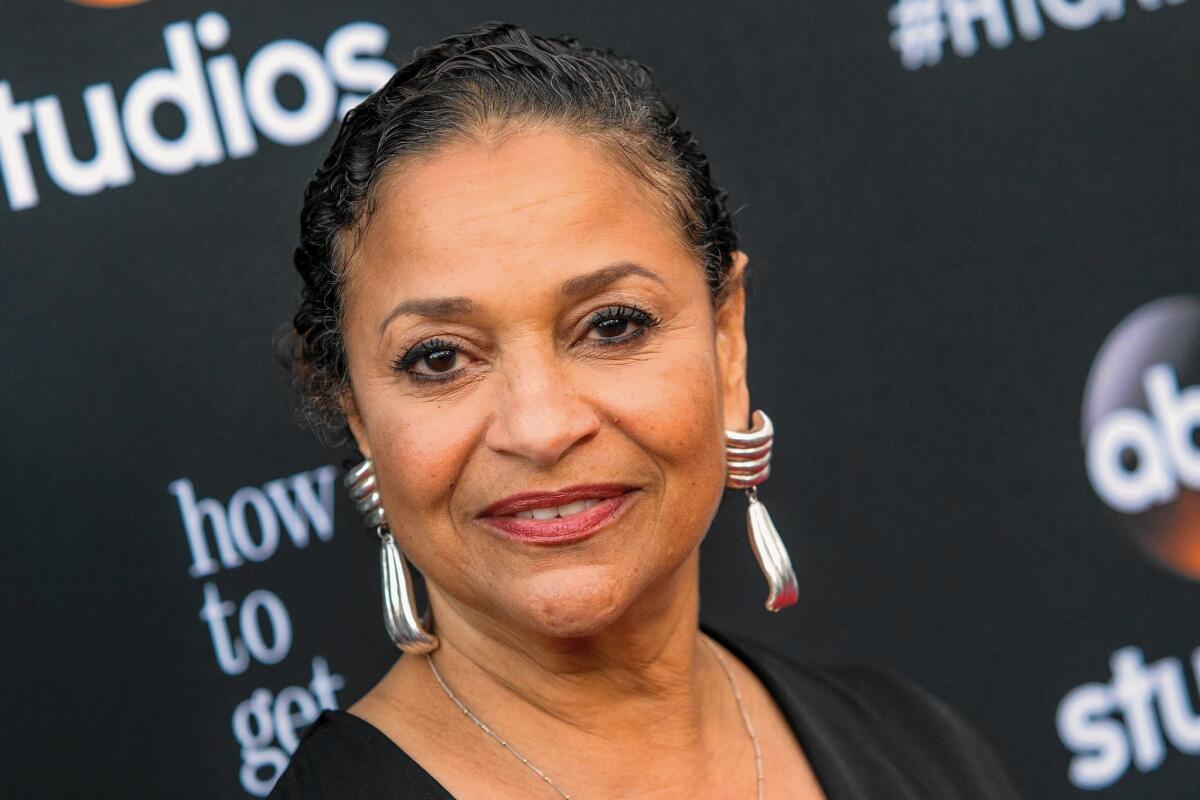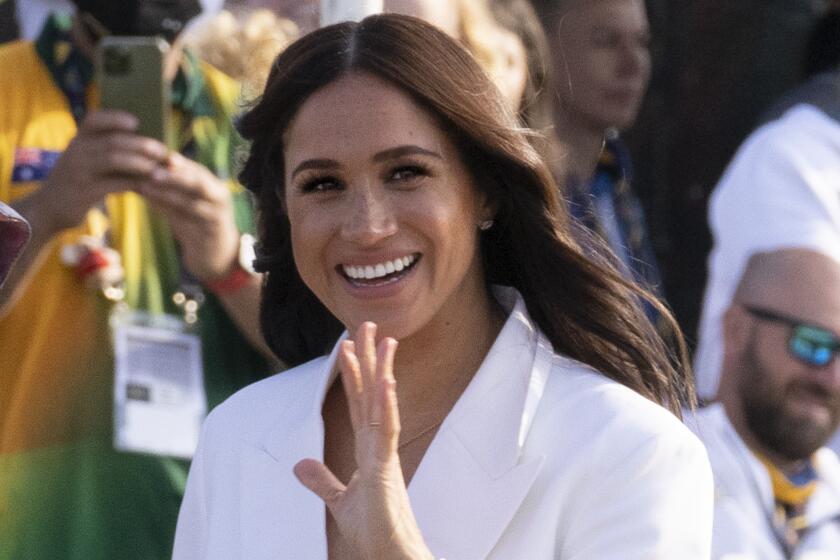There’s talk about bringing back the Black Oscars
- Share via
They gathered at the Beverly Wilshire, the men in tuxes, the women draped in evening gowns. The finest black talent in Hollywood was there that night in 2002, Quincy Jones, Samuel L. Jackson, Morgan Freeman, James Lassiter, Doug McHenry and Sean “P. Diddy” Combs among them.
It was an annual gathering held at one posh hotel or another on the eve of the Academy Awards. Officially, it was called the Tree of Life Awards. But most people called it by its informal name: the Black Oscars.
“It was always a celebration of what accomplishments black people had done in the film industry,” said actress and director Debbie Allen, who was honored by the Black Oscars and its sister event, the Black Emmys. “Sound, music, directors, actors, whatever your participation was, you were honored.”
The annual event was launched in 1981 at a time when the Academy of Motion Picture Arts and Sciences rarely recognized black achievements. By that time, only 27 African Americans had been nominated in the 52-year history of the Oscars, with only three winning. The Tree of Life Awards ended in 2007.
Oscars 2016: Full Coverage | Complete list | Snubs, surprises and reactions | Top nominee photos
But with the academy nominating an all-white slate of actors for the second year in a row, Gil Robertson, president of the African American Film Critics Assn., says the circumstances that prompted the Black Oscars are prevalent again.
“It began as a way to fill a void in the city and in the community,” he said. “People work hard and invest in their craft and were being ignored … so the Black Oscars became a way for them to receive acknowledgment of their talents and their craft.”
The Tree of Life Awards were created by the late Albert Nellum, a Washington, D.C.-area attorney, the event taking its name from the ancient African symbol of family, unity and struggle for survival. A private group called the Friends of the Black Oscar Nominees ran the ceremony. Those involved in putting on the dinner included Jones, Sidney Poitier, Maya Angelou, Cicely Tyson and casting agent Reuben Cannon.
Black Oscar nominees were automatically invited along with others who had created important and influential work to the black community. Winners received black and bronze carved statuettes.
Louis Gossett Jr., who won an Academy Award for supporting actor for his portrayal of a Marine Corps sergeant in the 1982 film “An Officer and a Gentleman,” said the evening was a way for black Hollywood to uplift its own.
“It was something that was needed because we were all over the place trying to make our careers, which were dependent on [mainstream] acceptance,” Gossett said. “This got us ‘back to the roots’ to recognize one another and encourage one another to continue on. It was an extremely important thing.”
#OscarsSoWhite: The boycott, reaction and more
Gossett hosted the Black Oscars in 2002 with actress CCH Pounder, a regular on “Law and Order: Special Victims Unit” and “NCIS.” The tributes and calls for continued unity included honors for the year’s Oscar nominees Denzel Washington (“Training Day”), Halle Berry (“Monster’s Ball”) and Will Smith (“Ali”). Smith’s “Ali” costar and wife, Jada Pinkett Smith, who also starred in “Kingdom Come,” was also honored along with “Baby Boy’s” Ving Rhames, “Ocean’s 11’s” Don Cheadle and the late Bernie Mac.
Over the years, honorees and attendees have included Queen Latifah, Billy Dee Williams, Eddie Murphy, Vivica A. Fox and this year’s Oscars producer Reginald Hudlin.
Showing up, if invited, was imperative, Allen said. She remembers having to persuade Djimon Hounsou, star of Steven Spielberg’s “Amistad,” to attend.
“He didn’t understand how important it was for him to come until I told him,” she said. “We were anointing ourselves. We were acknowledging our presence and our worth, our value and our accomplishments.”

Today, Hollywood awards ceremonies are covered with an intensity equal to a presidential race. But the Tree of Life Awards were virtually unknown outside black Hollywood — and organizers were OK with that.
Though some years would include a red carpet with media, reporters invited to the dinner were not supposed to write about the event. Most complied; an archival search turns up scant references to the evening besides a story or two in the L.A. Sentinel and Jet magazine.
“It wasn’t something that was clandestine,” Robertson said. “But if you’re a part of the community, you knew. If you weren’t, you didn’t know.”
Robertson remembers being told explicitly to leave his notebook at home. The event was less of a moment for public consumption, but “a symbolic gesture [to black Hollywood] to say, ‘I see you. We can do this, and so we are,’” he said.
The off-the-record nature of the event allowed honorees to be honest about their shared experiences of being black in Hollywood when they took to the stage to accept their awards.
“It allowed people to be transparent,” Robertson said. “It allowed people to be forthright with a different level of openness because you know you’re not going to be quoted. It’s like you went to a house party and you’re just chilling out.”
The day following the Black Oscars, those who were invited to the Academy Awards would attend that ceremony.
With eight black actors nominated for the 2007 awards show, the Friends of the Black Oscars decided it was time to retire the ceremony. Jennifer Hudson, sound mixer Willie D. Burton and Forest Whitaker secured Oscars that year.
But following the fallout from the #OscarsSoWhite conversation, Allen says some people have raised the prospect of reviving the tradition.
To Robertson, the recognition of achievement by fellow African Americans might even have more meaning now.
“I think that we need to become content with the kind of validation [we get from our own] and if other validation comes, great,” he said. “It’s just the whip cream on top. But I’m gon’ have the milkshake regardless.”
Twitter: @TrevellAnderson
MORE:
#OscarsSoWhite joins a long line of Oscar controversies
Black films matter at the Pan African Film & Arts Festival
2016 awards season database: Search all of the nominees and winners
More to Read
The complete guide to home viewing
Get Screen Gab for everything about the TV shows and streaming movies everyone’s talking about.
You may occasionally receive promotional content from the Los Angeles Times.







